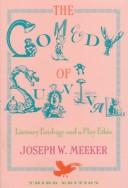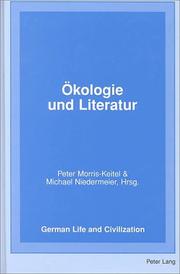| Listing 1 - 10 of 89 | << page >> |
Sort by
|

ISBN: 0816516855 9780816516858 0816516863 9780816516865 Year: 1997 Publisher: Tucson : University of Arizona Press,
Abstract | Keywords | Export | Availability | Bookmark
 Loading...
Loading...Choose an application
- Reference Manager
- EndNote
- RefWorks (Direct export to RefWorks)
Here, Joseph Meeker expands upon his consideration of comedy and tragedy, not as dramatic motifs for humor and sadness but rather as forms of adaptive behavior in the natural world that either promote our survival (comedy) or estrange us from other life forms (tragedy). In this third major edition of his classic work, Meeker examines the role of literature in shaping such behavior. Drawing upon centuries of western writing from Dante to Shakespeare to E.O. Wilson, he demonstrates the universality of comedy in both human and animal behavior and shows how the comic mode helps us to live in harmony with nature. Meeker then defines the tragic view of life, interweaving that behavior with exploitation of the environment. With imagination and flair, the author also introduces the idea of a play ethic, as opposed to a work ethic, and demonstrates the importance of play as a necessary and desirable component of the comic spirit. The Comedy of Survival is a book for literary critics, environmentalists, human ecologists, philosophers, and anthropologists. General readers, too, will find much to ponder in the author's clear explication of how all of us might become better stewards of this, our home planet Earth.
Human ecology in literature. --- Human ecology in literature. --- Literatur. --- Ökologie.
Book
ISBN: 0367500914 9780367500917 Year: 2022 Publisher: Abingdon: Routledge,
Abstract | Keywords | Export | Availability | Bookmark
 Loading...
Loading...Choose an application
- Reference Manager
- EndNote
- RefWorks (Direct export to RefWorks)
"Towards an Ecocritical Theatre investigates contemporary theatre through the lens of Anthropocene-oriented ecocriticism. It assesses how Anthropocene thinking engages different modes of theatrical representation, as well as how the theatrical apparatus can rise to the representational challenges of changing interactions between humans and the nonhuman world. To explore these problems, the book investigates international Anglophone plays and performances by Caryl Churchill, Stephen Sewell, Andrew Bovell, E.M. Lewis, Chantal Bilodeau, Jordan Hall, and Miwa Matreyek, who have taken significant steps towards re-orienting theatre from its traditional focus on humans to an ecocritical attention to nonhumans and the environment in the Anthropocene. Their theatrical works show how an engagement with the problem of scale disrupts the humanist bias of theatre, provoking new modes of theatrical inquiry that envision a scale beyond the human and realign our ecological culture, art, and intimacy with geological time. Moreover, the plays and performances studied here, through their liveness, immediacy, physicality, and communality, examine such scalar shifts via the problem of agency in order to give expression to the stories of nonhuman actants. These theatrical works provoke reflections on the flourishing of multispecies responsibilities and sensitivities in aesthetic and ethical terms, providing a platform for research in the environmental humanities through imaginative conversations on the world's iterative performativity in which all bodies, human and nonhuman, are cast horizontally as agential forces on the theatrical world stage. This book will be of great interest to students and scholars of theatre studies, environmental humanities, and ecocritical studies"--
Drama --- Theater --- Human ecology in literature --- Ecocriticism --- Civilization, Modern

ISBN: 0415981026 9780415981026 9780203939178 9781135860974 9781135861018 9781135861025 9780415803045 Year: 2007 Publisher: New York (N.Y.) : Routledge,
Abstract | Keywords | Export | Availability | Bookmark
 Loading...
Loading...Choose an application
- Reference Manager
- EndNote
- RefWorks (Direct export to RefWorks)
Book
ISBN: 9781138827721 113882772X 9781315738635 9781317574293 9781317574309 9781138235816 Year: 2015 Publisher: New York ; London : Routledge,
Abstract | Keywords | Export | Availability | Bookmark
 Loading...
Loading...Choose an application
- Reference Manager
- EndNote
- RefWorks (Direct export to RefWorks)
This book examines current trends in scholarly thinking about the new field of the Environmental Humanities, focusing in particular on how the history of globalization and imperialism represents a special challenge to the representation of environmental issues. Essays in this path-breaking collection examine the role that narrative, visual, and aesthetic forms can play in drawing attention to and shaping our ideas about long-term and catastrophic environmental challenges such as climate change, militarism, deforestation, the pollution and management of the global commons, petrocapitalism, and the commodification of nature.
Ecocriticism. --- Environmentalism in literature. --- Postcolonialism in literature. --- Human ecology in literature. --- Postcolonialism in literature --- Ecology --- Ecocriticism
Book
ISBN: 3030779726 3030779734 Year: 2021 Publisher: Cham, Switzerland : Springer,
Abstract | Keywords | Export | Availability | Bookmark
 Loading...
Loading...Choose an application
- Reference Manager
- EndNote
- RefWorks (Direct export to RefWorks)
Literature --- Human ecology in literature. --- Literature and philosophy --- Philosophy and literature --- Philosophy. --- Theory
Book
ISBN: 9783030779733 9783030779740 9783030779757 9783030779726 Year: 2021 Publisher: Cham Springer International Publishing :Imprint: Palgrave Macmillan
Abstract | Keywords | Export | Availability | Bookmark
 Loading...
Loading...Choose an application
- Reference Manager
- EndNote
- RefWorks (Direct export to RefWorks)
Literature --- literatuur --- Human ecology in literature. --- Literature and philosophy --- Philosophy and literature --- Philosophy. --- Theory

ISBN: 0820448729 9780820448725 Year: 2000 Publisher: New York (N.Y.) : Lang,
Abstract | Keywords | Export | Availability | Bookmark
 Loading...
Loading...Choose an application
- Reference Manager
- EndNote
- RefWorks (Direct export to RefWorks)
German literature --- Human ecology in literature. --- Nature in literature. --- History and criticism.
Book
ISBN: 9781498555388 Year: 2021 Publisher: Lanham : Lexington Books,
Abstract | Keywords | Export | Availability | Bookmark
 Loading...
Loading...Choose an application
- Reference Manager
- EndNote
- RefWorks (Direct export to RefWorks)
"Bringing together work from twelve leading scholars in the field of ecocriticism, Modernism and the Anthropocene explores the diverse ways that early twentieth-century literature initiated far-reaching conversations about the material and non-human world"--
Book
ISBN: 0367683385 1003136982 1000432483 1003136982 Year: 2021 Publisher: Milton : Taylor & Francis Group,
Abstract | Keywords | Export | Availability | Bookmark
 Loading...
Loading...Choose an application
- Reference Manager
- EndNote
- RefWorks (Direct export to RefWorks)
"This volume presents an interdisciplinary dialogue between sociology, geography, political sciences, history, and literary, cultural and media studies. Together, they contribute to current debates on the (re-)imagining of forms of human responsibility that meet the challenges created by humanity entering an age of scalar complexity"--
Book
ISBN: 1438479867 1438479875 1438479883 Year: 2020 Publisher: Albany, New York : State University of New York Press,
Abstract | Keywords | Export | Availability | Bookmark
 Loading...
Loading...Choose an application
- Reference Manager
- EndNote
- RefWorks (Direct export to RefWorks)
"Charlotte Brontë at the Anthropocene argues that Brontë was an attentive witness of the Anthropocene and created one of the first literary ecosystems animated by human-caused environmental change. Living in rural, industrializing Yorkshire in the early- and mid-nineteenth century, Brontë was squarely placed, both in time and space, at the inauguration of this new geological era, identified by contemporary climatologists as the successor to the Holocene. As the rapidly escalating consequences of a globalizing Industrial Revolution rendered human action the most powerful force shaping the Earth, Brontë combined her personal experiences, scientific knowledge, and narrative skills to document environmental change in her representations of moorlands, valleys, villages, and towns, and the processes that disrupted them, including extinction, deforestation, industrialization, and urbanization. In her novels, Brontë layers visions of ecological change at multiple timeframes-from the macrocosmic scale of geological deep time to the microcosmic scale of a single ecological crisis-to tell stories about the Anthropocene at the scale of a human lifetime. Close reading of Brontë's fiction and juxtaposing it with Victorian and contemporary science writing, as well as with the writings of her family members, reveal the importance of storytelling for understanding how human behaviors contribute to environmental instability and why we resist changing our destructive habits. Ultimately, Brontë's lifelong engagement with the nonhuman world offers five powerful axioms for surviving ecological crises and thriving under unpropitious conditions: to witness destruction carefully, to write about it unflinchingly, to apply those experiences by questioning and redefining toxic definitions of the human, and to mourn the dead, all without forgetting to tend the living"--
| Listing 1 - 10 of 89 | << page >> |
Sort by
|

 Search
Search Feedback
Feedback About UniCat
About UniCat  Help
Help News
News